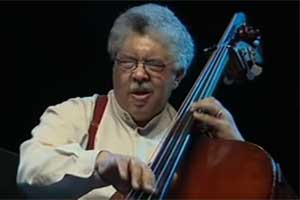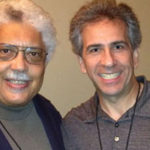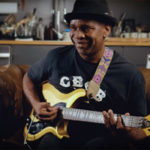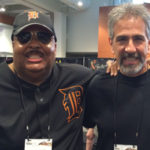Jazz legend goes one-on-one with FBPO, as he discusses performing, composing, teaching and more!
Exclusive interview with FBPO’s Jon Liebman
December 14, 2009
Rufus Reid is a forty-five year veteran bassist. Often referred to as a chameleon, his musical prowess is demonstrated in a wide array of performance settings, including a discography of over 350 recordings. In addition to being a performer, Rufus is equally known as an exceptional educator, teaching clinics and workshops all over the world. His book and DVD, The Evolving Bassist, is recognized as the industry standard as the definitive bass method.
Rufus has received numerous grants and fellowships over the years from several prestigious organizations, including the Doris Duke Foundation, ASCAP and the John Simon Guggenheim Memorial Foundation. He is also the recipient of the Raymond Sackler Composition Commission prize. Reid maintains a very complete schedule as an active performer, composer, educator and bandleader.
FBPO: You grew up as a trumpet player, all the way through high school and even as a member of the Air Force band. What got you so deeply interested in the bass? The fascination seems to have come on rather suddenly. Is that true?
RR: No, not really all that suddenly. I had always been infatuated with the bass when I played in a small ensemble in high school. Little did I know that I would really get into it when I joined the Air Force Band. I was an average trumpet player. I began teaching myself the bass those first two years in the Air Force because there was a lot of free time. The band had an acoustic bass, which was a good thing because I didn’t even own one then. Eventually I did buy an electric. Some of the older guys in the band liked my time feel and the fact that I was ready to play anytime and anywhere. I knew nothing about chords or chord symbols, but I could read the BIG letters and let my ears guide me through the rest. I loved it! Five years later, after a lot of playing and taking lessons, I finished my time for Uncle Sam, sold my trumpet and bought my first acoustic bass the same week. This is the same bass I used on all the Thad Jones/Mel Lewis, Dexter Gordon and Jack DeJohnette recordings.
FBPO: How much trumpet playing do you do these days?
RR: Absolutely none! I came to my senses a long time ago. I can still make a sound, but it make you laugh!
FBPO: You’re so steeped in both jazz and classical music. Is your passion stronger for one than the other, or do you love them both “differently but equally?”
RR: I actually know more about jazz because it’s what I do. Improvising, particularly with others, is what really excites me. I love going for the unknown. That being said, I do, however, love to listen to all kinds of music, including classical music. When it sounds good to me, it sounds good!
FBPO: How about performing versus composing?
RR: Performing is what I do best, to be sure, but I certainly love composing more and more! I am smitten with the process of composition and I feel there has been a direct correlation between my composing and my bass playing, in a good way. I think more about shapes and colors to add to the notes.
FBPO: In addition to being revered as a master of the bass, you’re widely – perhaps equally – known as an educator. What got you interested in teaching?
RR: When I was living in Chicago, someone heard me play and asked if I would teach him. I initially said no, but he persisted and I eventually gave in. It was interesting. I didn’t really want to be a teacher because I didn’t want to be like some of the teachers I had. Eventually, though, I got more students and it seemed I resonated well with them. This is why I am still willing to work with players now. I do it well and I work very diligently to get them to understand what they need to do to become better.
FBPO: What message do you think music majors need to hear today about the career upon which they hope to embark?
RR: If they really have the passion to play this music, they need to work hard on their instrument! Study harmony, big time! Don’t whine about how much work it is! Don’t try to be famous first. Let someone else tell everyone how good you are. Stay friendly with the piano at all times.
FBPO: How has that message changed in the past, say, 25 years? On the one hand, they need to “give it all they got” if they truly want to excel in their craft, yet, on the other hand, they need to be realistic in setting their career goals. How do you help them find the proper balance?
RR: In my opinion, it hasn’t changed at all. Having the passion is paramount, but one needs a lot more than passion to do well. Everyone is striving to have their own voice as a creative player, but that doesn’t really become visible right away. Study the various styles, emulate, copy and listen to yourself closely. Be more responsible of what comes out of the bass. You should have role models to guide and give inspiration, but don’t let it stay there. To survive and succeed as a creative player you must be convincing to individuals who hear you play that you are serious and belong in that musical setting, whatever it happens to be. You must begin to love the way you play and SOUND! If you don’t, why should I like your playing?!
I have the same passion, if not more now, than when I was younger. I wish this to happen to all of you reading this! When one works hard to achieve his or her goals, protect it with knowledge. No one can take it away from you except you!
FBPO: I’ve had my copy of The Evolving Bassist since not too long after it first came out (by the way, the method you illustrated for taking a double bass on an airplane no longer applies!). It must feel good knowing you’ve written a classic. What are some of the other teaching methods you’ve had published?
RR: I am very proud of my book. I am amazed it is still out there and helping players because that is what it was designed to do! I did combine my two books into one with added material into the 2000 Millennium Edition. There is also the two-and-a-half hour Evolving Bassist DVD available. If people have not seen me play live, this DVD works well.
FBPO: Tell me about the Sackler Commission Prize you received, enabling you to compose a tribute work to the artist, Elizabeth Catlett. I get the feeling that award was particularly meaningful to you.
RR: Yes, this was a very special commission. I proposed to write a four-movement work inspired by four of Elizabeth Catlett’s sculptures. The proposal resonated with the commission committee. Elizabeth Catlett is 93 years old and still producing as an artist. She is a very important artist that should be known more widely. Since writing the piece, I have met her and we have become friends. I am now working on presenting my music, along with her art and her story to art centers and colleges and universities by involving the jazz departments, art departments, Afro-American Studies and Women’s Studies departments, all working together. This is very exciting.
FBPO: In addition to your extensive work as a sideman, you’ve been quite prolific in releasing your own CDs as a leader. Are there any that stand out as favorites?
RR: I have been blessed to have my own projects. I am extremely proud of all of them. These recordings are retrospective musical markers of where I was and am now. I am particularly proud of the Sunnyside release, The Gait Keeper and the most recent Motéma Music CD/DVD release, Rufus Reid Quintet – Live at the Kennedy Center. These two recordings introduce a broader view of my compositional excursions. Please check out the rest my recordings out on my website. In March 2010, a very special trio CD will be released on Motéma Music called, Rufus Reid – Out Front, featuring the brilliant pianist Steve Allee and an exceptional drummer from Brazil, Duduka Da Fonseca. Making music with these two masterful musicians makes me so happy. I am very excited about this release and hope all of you will buy it and love it too! [Laughs]
FBPO: So, what’s keeping you busy these days?
RR: Writing-wise, I just completed a concert band commission. That was really a different learning experience for me. Playing-wise, I was in Xalapa, Mexico, in August with a workshop and concerts with my big band music. In early December, I will be performing a concert in Portugal with Jimmy Cobb, Cedar Walton, Phil Woods and Lew Soloff. That is going to be BIG FUN! I also have some work coming up with my quintet and trio after the new year.
FBPO: What else lies ahead for Rufus Reid?
RR: I wish to stay healthy! I am in the process of composing a huge work for a full symphony orchestra with a jazz quintet embedded within the orchestra. This is made possible by me receiving a 2008 John Simon Guggenheim Fellowship for Composition. To balance things, my wife and I see our son and beautiful granddaughter as much as possible. Also this December we will celebrate our 40th anniversary! Yes, that’s correct and it is still going strong I am happy to say.







